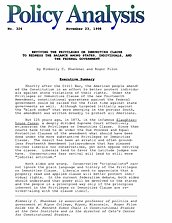But 125 years ago, in 1873, in the infamous Slaughterhouse Cases, a deeply divided Supreme Court effectively eviscerated the Privileges or Immunities Clause. Since then courts have tried to do under the Due Process and Equal Protection Clauses of the amendment what should have been done under the more substantive Privileges or Immunities Clause. The result has been an erratic and often groundless Fourteenth Amendment jurisprudence that has pleased neither liberals nor conservatives, yet both oppose reviving the clause. Liberals tend to favor the latitude judges now have. Conservatives fear revival will lead to still more “judicial activism.”
Both sides are wrong. Conservative “originalists” cannot ignore the plain language and history of the Privileges or Immunities Clause. Liberals need to appreciate that a properly read and applied clause will better protect individual rights. In the current federalism debate, both sides should understand that power will be devolved to the states and the people in a principled way only if the principles inherent in the Privileges or Immunities Clause are revived–along with the clause itself.

